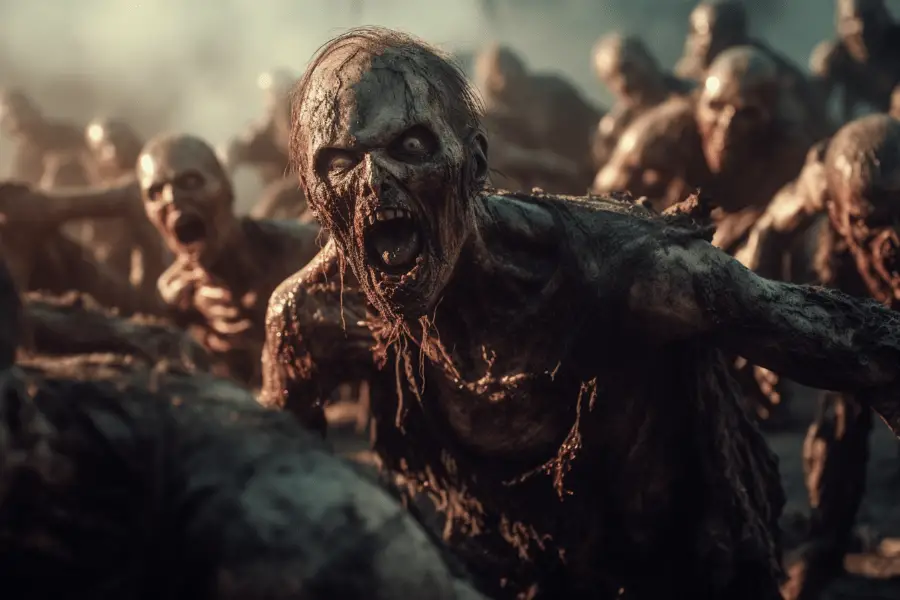Share the Lore!
By: Sid Meyers
The Return of the Restless Dead
Zombies have been a part of folklore and pop culture for centuries, but zombie revenants kick things up a notch. These are not your usual slow-moving, brain-eating zombies.
Zombie revenants are the restless dead who have returned to seek revenge on the living. They come in many shapes and from various causes, making them a fascinating subject for horror fans and scholars alike.
Definition of Zombie Revenants
The term “revenant” comes from the French word “revenir,” which means “to return.” In folklore, a revenant is someone who has returned from the dead to haunt or harm the living. A zombie revenant takes this concept one step further – these are corpses that have risen from their graves or come back to life seeking revenge on those who wronged them in life.
While traditional zombies are often portrayed as mindless creatures with an insatiable hunger for human flesh, zombie revenants are typically more focused on their mission of vengeance.
They may retain some semblance of their former selves, including skills and memories that allow them to carry out their revenge plot with deadly precision.
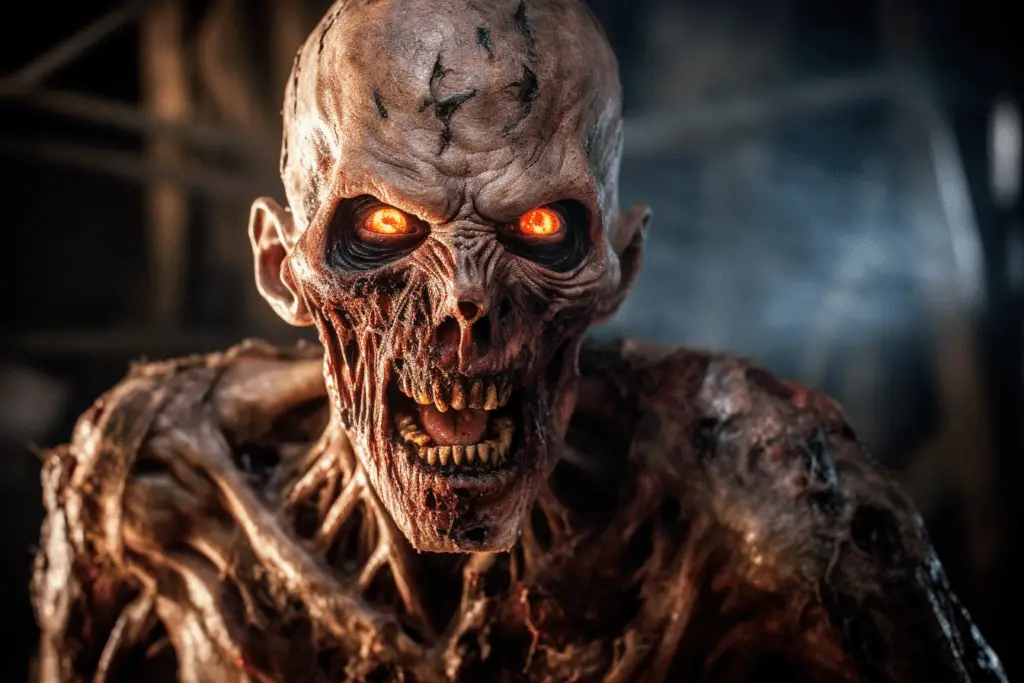
Brief History of Zombie Folklore
Zombie folklore can be traced back to ancient times. The Sumerians wrote about demons called “gidim” who rose from the underworld to possess humans and cause mischief.
In Haitian Vodou culture, zombies were believed to be reanimated corpses controlled by sorcerers known as bokors. But it was George A. Romero’s 1968 film Night of the Living Dead that really cemented zombies in modern pop culture consciousness.
Since then, there has been no shortage of movies, TV shows, and books featuring these undead beings – including zombie revenants seeking revenge on those who wronged them in life. Now that we have a basic understanding of what zombie revenants are and where they come from, let’s dive deeper into the different types and causes of these undead creatures.
Fun Fact: Zombies are not just confined to human form. In some cultures, there are legends of animal zombies, such as zombie dogs or zombie chickens.
Types of Zombie Revenants
Zombie Revenants come in many forms, each with its unique characteristics and behaviors. From the classic Romero-style zombies to Voodoo zombies and infected zombies, these restless dead bring terror wherever they go.
Classic Romero-style zombies
One of the most famous types of zombie revenants is the classic Romero-style zombie. These undead monsters first appeared in George A. Romero’s Night of the Living Dead in 1968, where they terrorized a group of survivors holed up in a farmhouse.
Romero-style zombies are slow-moving and relentless, driven by their insatiable hunger for human flesh. They are typically created by a viral outbreak that rapidly spreads across the population.
These zombies have become an iconic symbol of horror and have been featured in countless movies, TV shows, and video games over the years. Despite their slow movement, they are incredibly dangerous due to their overwhelming numbers.
Voodoo Zombies
Voodoo Zombies are a type of revenant that originates from Haitian folklore. Unlike other types of zombies that are created through viral outbreaks or curses, Voodoo Zombies are brought back to life through magic and ritualistic practices. They are often portrayed as mindless slaves under the control of a Voodoo practitioner or bokor.
Voodoo Zombies have been depicted in popular culture as creatures with no free will or consciousness but can still perform basic tasks like manual labor. However, traditional Haitian beliefs surrounding them suggest they possess more agency than what is portrayed in popular culture.
Infected Zombies
Infected Zombies differ from other types because instead of being reanimated corpses seeking revenge or sustenance for unknown reasons they were once humans infected by a virus that destroys their cognitive functions leading them to behave like vicious animals attacking anything around them including other humans.
The best-known example would be the zombies seen in 28 Days Later, which are not technically zombies but infected humans. These zombies move quickly and can be incredibly dangerous due to their agility, speed, and ferocity.
Infected Zombies are often used as a plot device in science-fiction shows and movies since they offer exciting chase scenes and plenty of action. They represent the danger of how easily a virus could turn us into monsters; this probably resonates deeper than any other type of zombie revenants with people living through a pandemic.
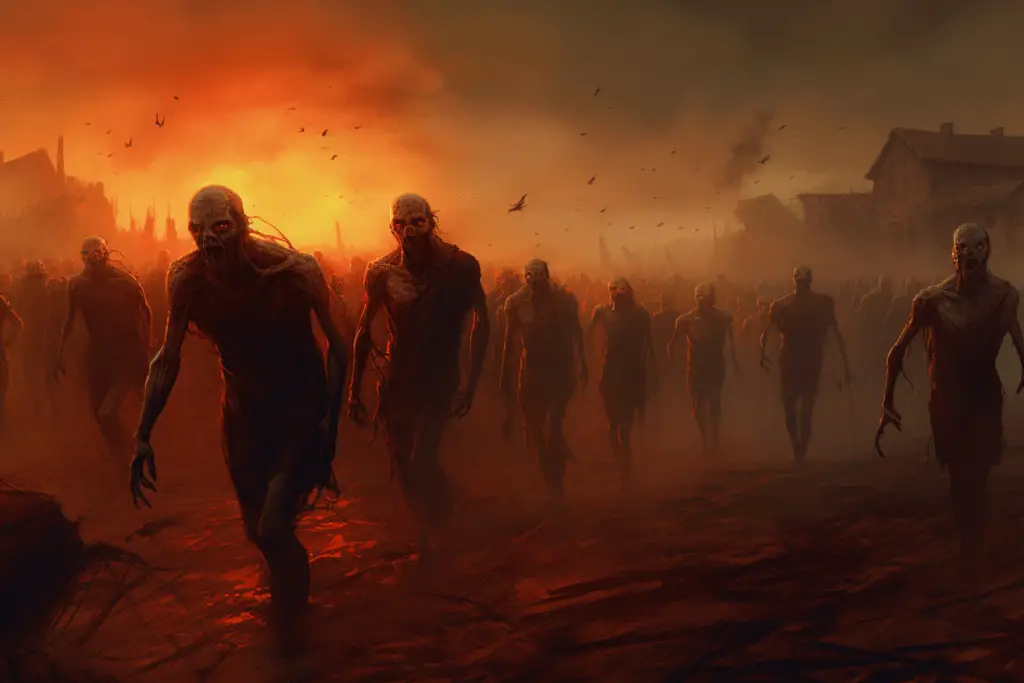
Causes of Zombie Revenancy
Viral Outbreaks: The Modern Plague
One of the most prevalent causes of zombie revenancy in modern pop culture is the viral outbreak. This type of zombie is typically created by a viral infection that spreads rapidly through a population, causing those infected to become mindless, flesh-eating monsters. In shows like The Walking Dead and movies like 28 Days Later, we see how easily a virus can spread and how quickly people can turn into zombies.
These types of zombie revenants are particularly terrifying because they reflect our very real fears about pandemics and the spread of disease. They also lend themselves well to tense, action-packed survival stories where characters must navigate a world overrun by the undead.
Necromancy: Dark Magic and Forbidden Arts
Necromancy is another classic cause of zombie revenancy, dating all the way back to ancient times when people believed that sorcerers could raise the dead to do their bidding. In modern pop culture, necromancers are often portrayed as dark wizards who use their forbidden arts to bring corpses back to life as mindless slaves.
The necromancer’s power over life and death is both awe-inspiring and terrifying, making them popular villains in many fantasy settings. From Diablo III’s Necromancer class to Dungeons & Dragons campaigns featuring powerful liches and undead armies, necromancers have become synonymous with death magic and the creation of zombie-like creatures known as revenants.
Curses: Vengeful Spirits Seeking Retribution
Curses are also an intriguing cause of zombie revenancy that have been explored in both fiction and folklore for centuries. In these stories, a person who has been wronged or betrayed may call upon dark spirits or put a curse on someone who has wronged them in order to exact revenge. This type of zombie revenancy is particularly interesting because it often involves a vengeful spirit returning from the dead to seek retribution.
These spirits are often depicted as being trapped in a state of limbo, unable to move on until their desire for revenge is sated. While these types of zombie revenants may not be as common in modern pop culture, they continue to fascinate us with their eerie tales of undead vengeance.
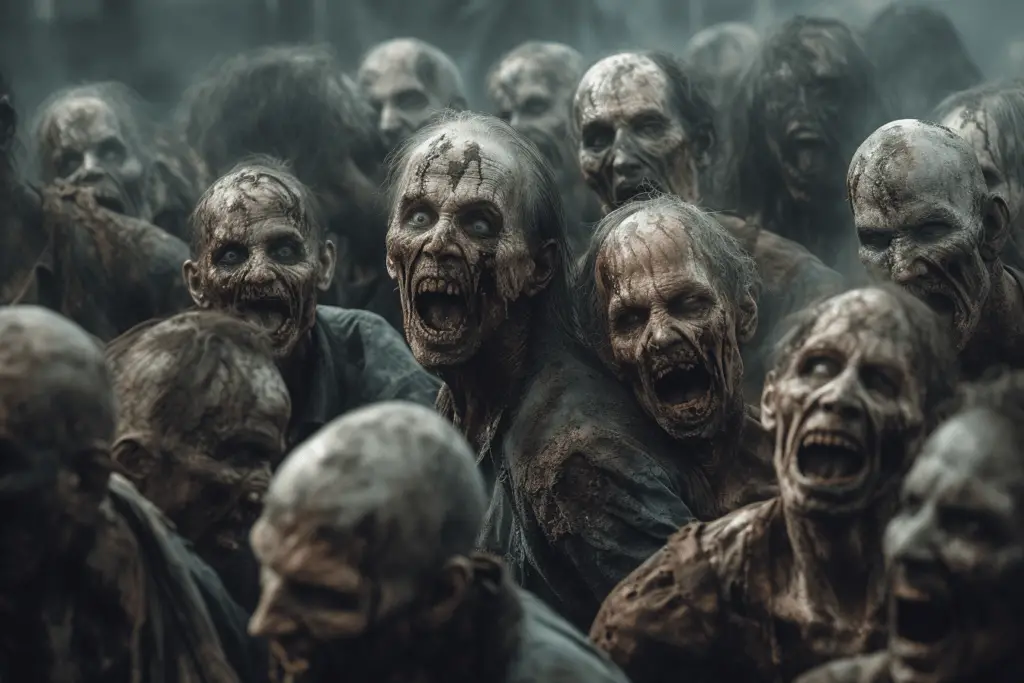
Fun Fact: Zombies have become a subject of serious academic study. Several universities and colleges offer courses that explore the cultural, social, and psychological implications of zombies, examining them as metaphors for various aspects of society.
The Psychology of the Restless Dead
Motivations for Seeking Revenge
Zombie Revenants are often depicted as soulless creatures with a single-minded determination to satisfy their hunger for human flesh. But what motivates them to seek revenge on the living? In many cases, it could be a result of unfinished business or unresolved trauma from their previous life.
Perhaps they were murdered or wronged in some way, and their desire for revenge kept them tethered to the mortal realm. Or maybe they were simply so consumed by rage and hatred in life that they couldn’t let go of those emotions even after death.
Whatever the reason, these motivations can make zombie revenants even more dangerous as they relentlessly pursue their targets with no regard for their own safety or well-being. It’s important to remember that they are not rational beings and cannot be reasoned with or appeased.
Loss of Self-Awareness and Identity
One of the most tragic aspects of becoming a zombie revenant is the loss of self-awareness and identity. These once-living beings are reduced to mindless shells that exist only to feed on others. They have no memory of who they were in life or any sense of self-preservation.
This loss of identity can also contribute to their motivations for seeking revenge. Without a firm grasp on who they are, zombie revenants may latch onto one singular emotion – anger, hatred, fear – and allow it consume them entirely.
It’s a reminder that our identities are fragile things and can be easily lost if we’re not careful. And if we’re unlucky enough to become one of the restless dead, our sense of self will be forever lost in an endless cycle of violence and hunger.
Famous Examples in Pop Culture
The Walking Dead franchise: The Triumph of Character-Driven Storytelling
The Walking Dead is perhaps the most popular and recognizable zombie media franchise, consisting of comics, video games, and a hit television series. At its core, what sets The Walking Dead apart from other zombie stories is the focus on character development.
This is what makes it such compelling storytelling. The show’s characters undergo massive transformations over the course of several seasons, facing unimaginable loss and trauma as they struggle to survive in a post-apocalyptic world overrun by zombies.
One of the most interesting things about The Walking Dead is how it uses zombies as a backdrop for exploring deeper human issues like morality and ethics. It’s often said that humans can be just as dangerous as zombies in this world – if not more so.
Themes like loyalty, betrayal, love, hate, community-building and breaking are all explored beautifully throughout the series. Additionally, The Walking Dead has proved that you don’t necessarily need flashy special effects or CGI to make an engaging science fiction story.
Resident Evil franchise: Zombies meet Survival Horror Gaming
The Resident Evil franchise began with a classic survival horror video game released for Playstation back in 1996. Since then it has expanded into one of the most successful multimedia franchises ever with numerous sequels spanning across various gaming systems including Xbox and PC gaming platforms.
What distinguishes Resident Evil games from other zombie horror games is their emphasis on puzzle-solving mechanics mixed with intense combat against waves of zombies – making it an ideal pick for survival-horror gamers who enjoy both elements.
In addition to the classic game mechanics are unique narratives like Resident Evil 7: Biohazard where players shift between playing different protagonists encountering similar situations but experiencing different outcomes based on their choices.
Overall, Resident Evil stands out not only because of its tense, immersive atmosphere and its zombie hordes but also due to its industry-defining graphics, sound design, gameplay mechanics, and the lore that has been built around it.
Fun Fact: The earliest depiction of zombies in film can be traced back to the 1932 movie "White Zombie," starring Bela Lugosi. It is considered one of the first zombie films ever made.
Night of the Living Dead: The Granddaddy of All Zombie movies
George A. Romero’s low-budget 1968 film Night of the Living Dead is considered by many to be the movie that started it all in terms of today’s modern day zombie craze. The film follows a group of survivors who barricade themselves inside a farmhouse while surrounded by an army of flesh-eating zombies.
What makes Night Of The Living Dead so remarkable is how much it subverted common horror tropes at the time; for instance, killing off its main character halfway through the movie and casting an African-American actor as lead when such portrayal was rare in Hollywood at that time.
Romero’s work introduced new elements to horror cinema and inspired a whole new wave of zombie movies which continue being made today.
It laid out several conventions such as slow, shuffling zombies onscreen, as well as using them metaphorically to represent societal ills like consumerism or conformity. All in all, Night Of The Living Dead remains a must-watch classic in any serious horror fan’s collection.
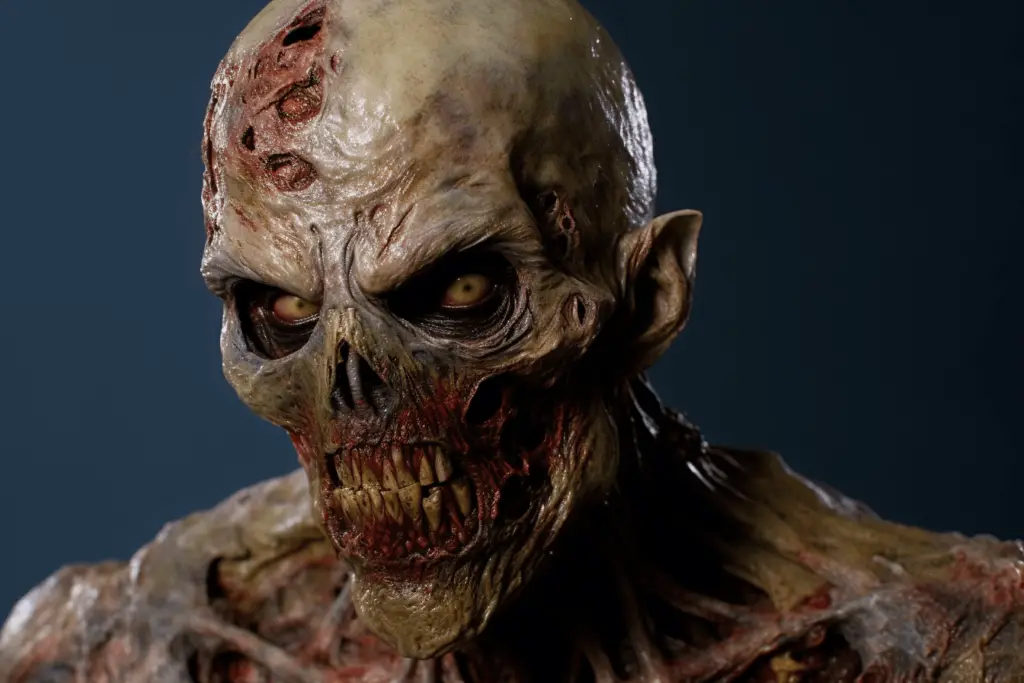
Haitian Zombie Legends
The concept of zombies has been a part of Haitian folklore for centuries. In Haitian Vodou, the term “zombi” refers to a person who has been brought back from the dead through magical means.
The zombi is not seen as a brain-eating monster, but rather as a servant without free will, completely obedient to their master’s commands. According to legend, a person could be turned into a zombie through various means such as being cursed by someone with magical powers or being given a potion made with certain ingredients.
The idea of zombie slaves was used as a form of social control during slavery in Haiti and continued into modern times. There have been many cases of people claiming to have seen or even interacted with zombies in Haiti.
The Case of Clairvius Narcisse
One famous example of alleged zombification is the case of Clairvius Narcisse. In 1962, Narcisse was pronounced dead and buried in his hometown in Haiti.
However, 18 years later he returned to his village claiming that he had been turned into a zombie and forced to work on plantations during that time. Narcisse claimed that he was given some kind of powder by his brother which caused him to fall ill and appear dead.
His body was then taken away by unknown individuals who revived him using more powders and forced him into slavery for years before finally escaping. While some skeptics believe that Narcisse may have faked his own death or suffered from some kind of mental illness, others believe his story is proof that zombification is real.
The Story of Billie Jo Ahearn
Another alleged victim of zombification was Billie Jo Ahearn, an American woman who traveled to Haiti in 1997 seeking treatment for chronic pain. According to her family, Ahearn was given an unknown substance in Haiti which caused her to fall into a coma.
When she woke up, she claimed to have been made into a zombie and forced to work on a sugar plantation. Ahearn’s story gained widespread media attention and sparked controversy among skeptics and believers alike.
While some believe that Ahearn may have been the victim of a scam or false memories due to her illness, others argue that her story is further evidence of the existence of zombies. Regardless of the truth behind these stories, they serve as eerie reminders of the enduring fascination with zombie legends in Haitian culture.
How to Survive a Zombie Revenant Attack
The Importance of Preparation
When it comes to surviving a zombie revenant attack, preparation is key. This means having a survival plan in place before an outbreak occurs.
Your plan should include how you will secure your home or other safe location, what supplies you will need to survive (such as food, water, medical supplies, and weapons), and how you will communicate with other survivors. It’s also important to stay informed about the latest developments in the outbreak.
Monitor news reports and social media for updates on the spread of the virus or curse causing the zombie revenant outbreak. This information can help you make informed decisions about where to go and what actions to take.
Fun Fact: The Centers for Disease Control and Prevention (CDC) in the United States used the popularity of zombies to raise awareness about emergency preparedness. In 2011, they released a "Preparedness 101: Zombie Apocalypse" guide to engage and educate the public about disaster readiness.
Tips for Dealing with Zombie Revenants
If you find yourself face-to-face with a zombie revenant, there are several things you can do to increase your chances of survival. First and foremost, avoid getting bitten or scratched by the zombie.
The virus or curse causing the zombie revenant outbreak is transmitted through bodily fluids, so any contact with infected blood or saliva can result in infection. Next, focus on disabling the zombie.
Aim for its head – destroying the brain is the only way to truly kill a zombie. Use any weapons at your disposal – guns, knives, blunt objects – but be prepared for close combat if necessary.
Remember that zombies are attracted to noise and movement. Try to move stealthily and quietly if possible.
If you do need to run or fight, try to do so quickly and efficiently before more zombies are attracted by the commotion. By following these tips and staying prepared for any situation, you can increase your chances of surviving a zombie revenant attack – just remember that in this world of restless dead seeking revenge against humanity’s living descendants – anything is possible!
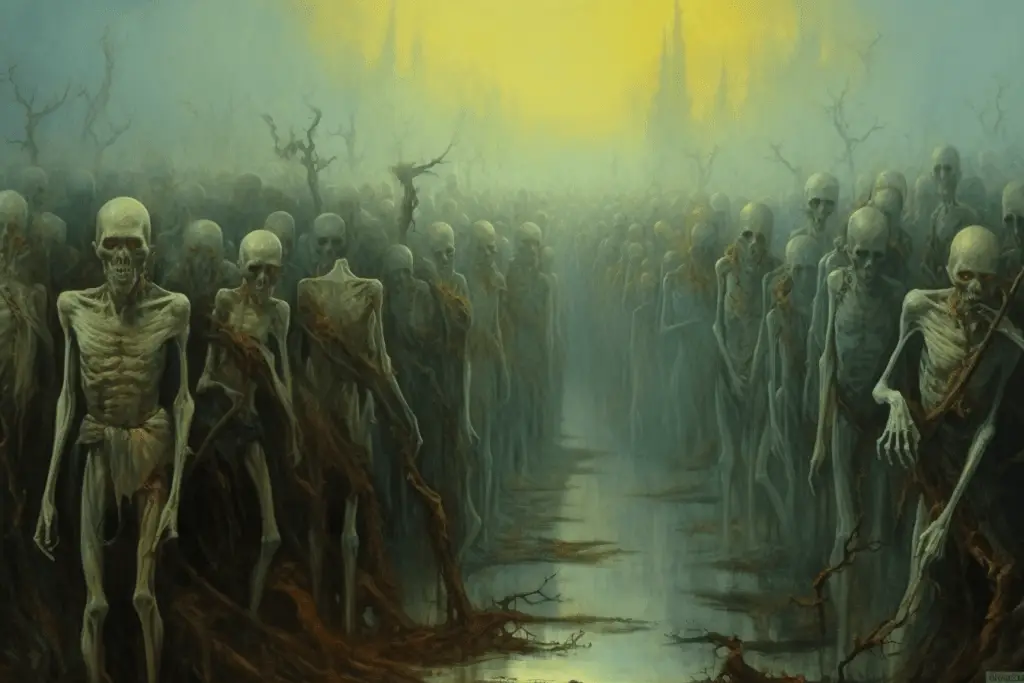
Conclusion
The Undeniable Allure of Zombie Revenants
There’s no denying that zombie revenants have captured the imaginations of people from all walks of life. From literature to film, and from video games to graphic novels, the undead have been a staple of popular culture for decades.
Why is this so? Part of it may be linked to our fascination with death and the unknown.
Most people will never experience the afterlife, but through zombie stories, we can imagine what it might be like. Additionally, zombie stories are often used as a metaphor for societal issues such as consumerism or government corruption.
But perhaps there’s a simpler answer: zombies are just plain fun. They offer an escape from reality and allow us to indulge in our fear of the unknown without any real risk.
The Importance of Preparedness
While it’s unlikely that we’ll ever encounter a zombie apocalypse in real life, there are still valuable lessons we can learn from zombie stories when it comes to preparedness. Firstly, having a plan is crucial in any emergency situation. Knowing where to go and what supplies you need can mean the difference between life and death.
Secondly, teamwork is essential during times of crisis. In many zombie stories, those who survive are often those who band together and work toward a common goal.
Adapting to changing circumstances is important when dealing with any emergency situation – including one involving zombies! Being able to assess your surroundings quickly and make decisions on-the-spot could save your life.
While the idea of zombies may seem far-fetched or even silly at times, there are valuable lessons we can take away from these tales of undead creatures seeking revenge.
Whether it’s being prepared for an emergency or simply enjoying some escapist entertainment, zombies continue to capture our imagination – and they’re not going anywhere anytime soon.
